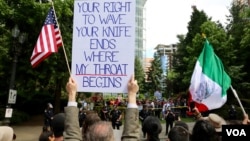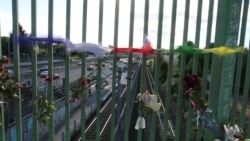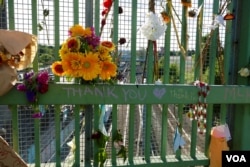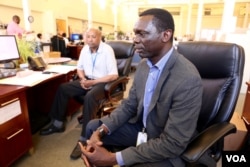Shortly after President Donald Trump’s inauguration, Chadian-native Djimet Dogo was dining with his three kids - ages five, eight, and 12 - at a Taco Bell restaurant in Springfield, Oregon, a northwestern U.S. town of 60,000 two hours south of the city of Portland.
Unprompted, a man Dogo described as white and in his 70s walked up to him and his family.
“[He] said, ‘You know what I like about black people? When they smile, you see a white thing in their face,’ and just walked away.”
A cashier, he says, came over in a hurry. “‘That’s not fair. Sir, are you okay?’
“I said, ‘Oh, I’m fine. I’m used to those kinds of things.’"
Dogo arrived in the U.S. 18 years ago as a guest of the U.S. Department of State to speak on African democracy. After being granted asylum, he settled in Portland where he knew a cousin.
He became part of Oregon’s 10 percent foreign-born population, some of whom he would later serve as Africa House Director at the Immigrant & Refugee Community Organization (IRCO).
“We, either as refugees or immigrants, come here because you are scared from certain kinds of hate, and then you come here and see a different kind of hate,” Dogo explained. “You don’t know what to do.”
“There’s no home to go to, and at the same time you are trying to consider this as your home, and you are not welcome.”
Liberal city, racist past
The northwestern U.S. city of more than 600 thousand has an unofficial slogan: “Keep Portland Weird.” The reference affectionately sums up the quirkiness the city is known for. Politically liberal, the city and its surrounding county firmly voted against Trump by a 73.9 percent to 17.1 percent margin in the 2016 election.
But underneath is a history of racism in a city that is nearly three-quarters non-Hispanic white - 8.5 percent above the national average of 63.7 percent.
In a state that adopted exclusion laws in the 1800s aimed at discouraging settlement by black Americans, Portland was home to 9,000 Ku Klux Klan members in the early 1920s, and became a neo-Nazi skinhead haven in the 1980s.
But today, overt acts of racial violence are relatively rare, which is why Portlanders have been on edge since late May, when a suspected white nationalist stabbed and killed two men, both white, for standing up to harassment against two teenage girls, one of whom was wearing a hijab, on a commuter train.
Walidah Imarisha, an expert in Oregon black history, explains that communities of color, meanwhile, were “overwhelmingly” not surprised by the tragedy.
“Being able to be surprised is an incredibly huge privilege that people of color in Portland have never had the luxury of,” Imarisha told VOA. The formation of Portland’s institutions, including its housing, education, and criminal justice system, she said, have long catered to a “white homeland.”
“Even when the [exclusionary] laws are removed, there are the customs, there are the practices,” Imarisha said.
Once divided, always divided
A memory stings nearly 30 years later: a November 1988 night in east Portland when three neo-Nazis clubbed 27-year-old Mulugeta Seraw, an Ethiopian immigrant and graduate student, to death.
Following the stabbings in May of this year, Dogo says fear among immigrant families has escalated once again.
“I was talking to a family days ago, and they said, ‘Well, if they can kill two white people, imagine what they are going to do to us.’”
Randy Blazak, a criminologist and chair of the Oregon Coalition Against Hate Crime, told VOA there has been a clear uptick in recent hate incidents. In the case of Portland, Blazak notes, the city has seen pushback as a result of slowly becoming less white - 85.3 percent in 1980 (non-Hispanic white) versus 72.2 percent in 2010.
“There is a wound that has been there for a very long time and it heals a little bit, and then an incident like this comes along and sort of rips it off, and we are reminded of all this anger and pain that has always been there,” Blazak said.
During last month’s vastly pro-Trump “free speech” rally and “anti-hate” counter-rally, a show of solidarity against discrimination and violence, that modern-day divide among Portland’s political fringes was on full display in the city center: on one side, white men dressed in helmets and army fatigues or draped in American flags; on the other, also white “antifa” or anti-fascists, clad in black and hints of red, revealing just their eyes and an occasional expression across the brow.
The crowd of mostly peaceful protesters, separated by an avenue and thin line of armed police forces, shouted competing slogans outside City Hall: “Black Lives Matter,” “All Lives Matter.”
On the "anti-hate" side, Fi Alagoz, a mixed-race Portlander shouted hoarsely at a sole African-American, standing on the frontlines of the "free speech" side, nearly the extent of diversity in a vast sea of white. “Where’s your mama at? Are you that stubborn?”
“Quit selling yourself short!” yelled another, before a wave off flash grenades stunned both sides.
Across the street
“This is something I never felt was safe to do in Portland before, and now that there are others like me, I feel like I can come out and actually do this,” said Portlander David Willis, a self-described libertarian and “free-speecher.”
Willis denounced the commuter train murders, but insisted on the mostly pro-Trump camp’s right to make themselves heard - no matter the timing.
Portland-native Debbie Sluder, whose nephew is a police officer, acknowledged the extent of division in her city, which makes her sad.
“All of a sudden, it seems like the whole country is divided, and we want to see it get back together again where people are working together.”
But her view on the Black Lives Matter movement is as sincere on one side as it is tone-deaf to the other: “Nobody should be above anyone else. It all matters.
“President Trump has started focusing more on the community, let’s say where the blacks are living, or the gang violence,” Sluder said. “To me, that is where we start, not with blaming everybody.”
“They are trying to open the door,” concedes Cambodian-native Sophorn Cheang, Director of the IRCO Asian Family Center, but she says police have the wrong approach.
“They are trying to engage with our families, engage with the youth, they just don’t know how,” Cheang said, noting that in Cambodia, the public is taught to avoid any interaction with authorities.
‘The change starts with us’
In true Portland fashion, some city residents are taking steps on their own to address racism by attending a weekly meet-up group, led by Teresa Floyd, a woman of color and founder of The Bridge Project PDX.
The New Jersey-native, who moved to Portland six years ago because she needed some “fresh air,” discovered a growing interest among white liberal women to learn how to be become better racial justice allies. The group quickly swelled to 581 women.
“The change starts with us. It starts with families,” Floyd said. “It starts by calling your uncle who comes every Thanksgiving that you avoid because you don’t want to get into that deep conversation.”
At Africa House, Dogo says that while the struggle for equality remains, he has seen change among immigrants, whose needs have shifted over the years from just getting a job to playing a larger role in the economic development of the region.
And, in case the resulting message is not clear, he summarizes: “We’re going nowhere. We like this place.”









